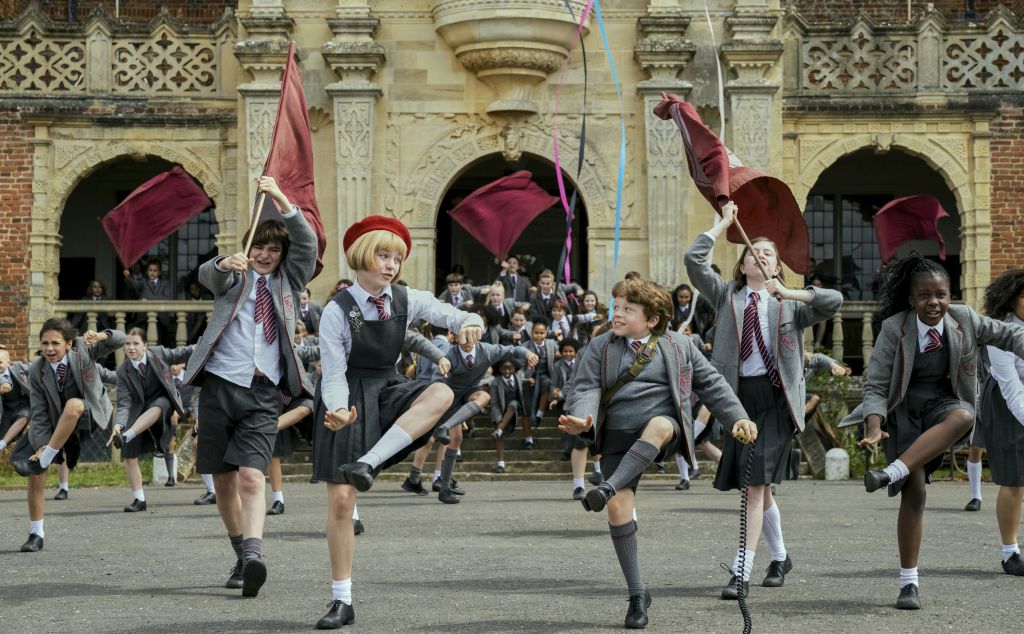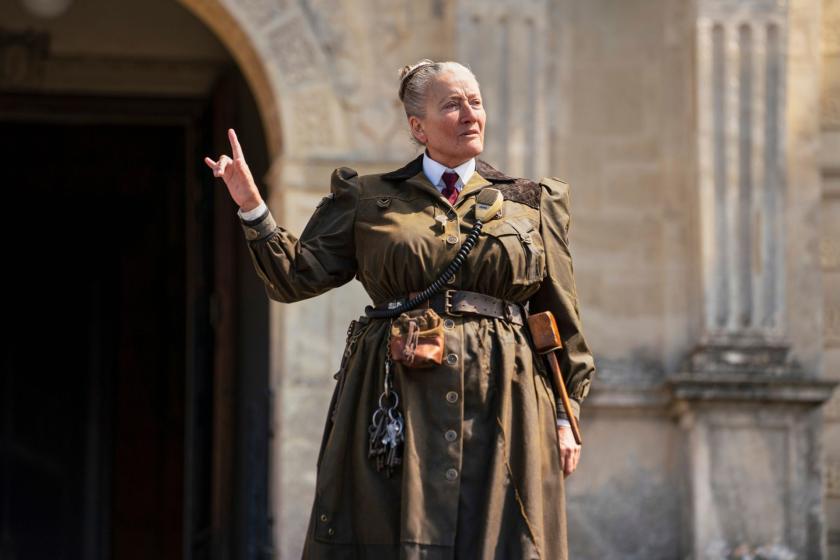I bow to no one in my affection for Matilda the Musical onstage, which I've loved across multiple iterations, from Stratford-upon-Avon to the West End and Broadway, and numerous cast changes, too.
But Matthew Warchus's screen iteration of his Roald Dahl-inspired ongoing London hit is an entirely separate triumph in and of itself, smartly adapted and ever so slightly reconceived so as to sneak the occasional nifty political reference into its universal tale of childhood angst.
As in the theatre, how can one not immediately warm to material in which the mere mention of literature excites the tremendously clever tyke of the title, played with an unforced sweetness by Alisha Weir, a Dubliner who is now 13.
At home with the rhetoric of Martin Luther King, Matilda Wormwood possesses exactly the sort of unbridled intellect that, in America just now particularly, seems to send the GOP into a panic. Reading, she tells her warmly supportive teacher Miss Honey (a radiant Lashana Lynch), is "like a holiday in your head", and this is a musical about what it takes to arrive at that destination and how one marries up the stories within you with the narrative that unfolds around you.
 Matilda's homelife leaves something to be desired, even if there's nothing wanting from the glorious grotesquerie of both Andrea Riseborough and Stephen Graham (the latter pictured above) as her chavvy parents: Mr W can't quite believe that libraries are "doing books now". (Matilda's older brother has been jettisoned from this version, as have the parents' numbers "Loud" and "Telly", as is fair enough given the compensations that lie elsewhere.)
Matilda's homelife leaves something to be desired, even if there's nothing wanting from the glorious grotesquerie of both Andrea Riseborough and Stephen Graham (the latter pictured above) as her chavvy parents: Mr W can't quite believe that libraries are "doing books now". (Matilda's older brother has been jettisoned from this version, as have the parents' numbers "Loud" and "Telly", as is fair enough given the compensations that lie elsewhere.)
From homeschooled to, well, school-schooled, Matilda is sent off to Crunchem Hall, where she falls under the tyrannical sway of Agatha Trunchbull, a hammer-throwing battle-axe who, rather like a certain recent American president, won't accept the word loss. Originally earmarked in the film for Ralph Fiennes, so as to perpetuate the stage show's tradition of handing this role to a man, the part has in fact been taken by a giddily imperious Emma Thompson who, between this performance and her stellar work in the contrastingly intimate Good Luck to You, Leo Grande, is having quite the celluloid year.
Often filmed in closeup so as to accentuate veins in her face that come to resemble armies-in-waiting, the Trunch is a surveillance-conscious termagant who presides over a barbed-wire encampment that registers less as a school than something potentially far more ominous. At the same time, Thompson's ebullience lets rip in her take-no-prisoner acrobatics and an airborne sequence in which this sexless scold is briefly glimpsed as the woman she once was - that's to say the emotional lockdown that has led to her current precarious state. (Informed that the Trunch is dangerous, Matilda coolly replies, "so am I": these two are well-matched.)
 Matilda has revolution in its DNA well before the ensemble number "Revolting Children" sends the students scampering into pole position as tomorrow's pioneers: here,as elsewhere, Ellen Kane's rousing choreography (pictured above) expands to suit the capacious potential of the screen, Matilda at one point seen doing handstands on the roof because, well, why not? The climactic toppling of a statue courses with a significance one couldn't have envisaged when this collaboration with Dennis Kelly (book) and Tim Minchin (music and lyrics) premiered as the RSC's Christmas show in Stratford in 2010, and the score here is in fantastic hands: Weir lends the necessary impishness to the self-defining "Naughty" and teams beautifully with Lynch on a duet late-on that delivers emotionally and then some.
Matilda has revolution in its DNA well before the ensemble number "Revolting Children" sends the students scampering into pole position as tomorrow's pioneers: here,as elsewhere, Ellen Kane's rousing choreography (pictured above) expands to suit the capacious potential of the screen, Matilda at one point seen doing handstands on the roof because, well, why not? The climactic toppling of a statue courses with a significance one couldn't have envisaged when this collaboration with Dennis Kelly (book) and Tim Minchin (music and lyrics) premiered as the RSC's Christmas show in Stratford in 2010, and the score here is in fantastic hands: Weir lends the necessary impishness to the self-defining "Naughty" and teams beautifully with Lynch on a duet late-on that delivers emotionally and then some.
Miss Honey, of all the characters, has been invaluably foregounded here in ways not to be revealed, while connecting up the rather cumbersome story of the acrobat and the escapologist to a broader take on abandonment and the very redefinition of family. Home, in Matilda as elsewhere, truly does require at last some amount of heart, and Lynch responds in full to the enrichment of a character who is able by the end to pronounce that Crunchem "is my school now": neither she nor her students will be demeaned or devalued any more. (There's a throwaway line about how poorly teachers are paid that deserves cheers of its own.)
Is it mere coincidence that the show talks of "maggots" just as we do sadly these days, as well, albeit spelled differently (MAGAts) and with more capital letters? Matilda, we learn, has telekinetic powers except that by contrast with Stephen King's Carrie, her gifts are the making of her, not her downfall. And by the time we get to the show's wondrous "When I Grow Up", conceived here as a sort of bucolic paean to life's possibility, it's impossible not to locate in this show about children a direct appeal to adults to be the best people that they can be. Amid our infantilised times, it's never too late to grow up.















Add comment